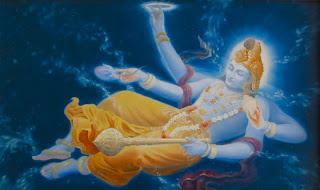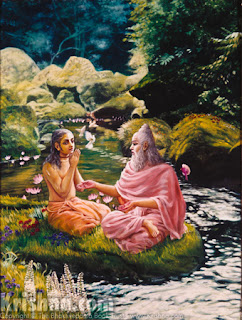The four grades of People - Sloka 13-15
1 Gita Sloka every day - Chapter 4 -JnanaKarmaSanyasa Yoga - Sloka 13
 |
| Sabari gets darshan of the Lord |
Chatuh varnay am maya srushtam guna karma vibhagasah I
Tasya kartarayam m api mam viddhy akrutram aviayam II sloka 13
चतुः वर्णयाम मया सृष्टं गुण कर्म विभगसः ।
तस्य कर्तारं अपि माम विद्ध्य अक्रुत्रं अवियं ।। श्लोक १३
The forufold caste was created by Me by the different distribution of Guna and karma. Though I be the author of thereof, know Me to be actionless and changeless.
Creation is effected by variation in the distribution of gunas. That jiva in whom sattva guna predominates is classified as brahmana. He is a Kshatriya in whom sattva seasoned by Rajas prevails. The man third in rank is the vaisya imbued mainly with rajas and sparingly with sattva and tamas. In sudra, the last man, tamas regulated by rajas is in the forefront.
Varna literally means caste as well as colour. White, red and black are respective colours of sattva, Rajas & Tamas. It maybe mentioned here that the universe is an imprint of the tri-gunas or tricolour. With the variations of the three gunas in man his colour undergoes change. The four classes of men are respectively white, lotus-red, yellow and black in colour. But this does not refer to the colour of the skin. If it did all white races would be brahmanas, Red Indians of America, Kshatriya, Mongolians as Vaisyas, & persons like Rama & Krishna sudras. Facts in nature do not warrant this position.
The worth of man is in the mind and not in the body. Mind has its colour according to its gunas. As man evolvesguna and mind which are interrelated get refined. The colour or the class of man goes up accordingly. from sudrahood through brahminhood, man evolves mentally, passing through kshatriyaood & vaisyahood. The enlightened alone see into the colour of the mind and know who is who among men.
The worldly man's classification of himself into the 4 castes based on birth and parentage is merely a convention ahardly ever tallying with his attainments. But the vedanta philosophical position is that among 4 brothers all the 4 varnas maybe evident. The real classification is based on the degree of ethical and spiritual perfection.
Things sentient and insentient are all constituted of the 3 gunas. They lend themselves therefore to the natural division into the 4 varnas mentioned by the Lord. The plan of nature is that being low in varna evolve into those higher.
If the social structure fabricated by man conforms with the divine plan. The incarnations of god that come of age after age set aright the fallen varna dharma.













